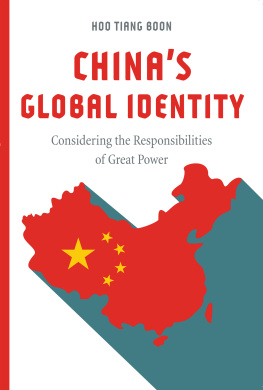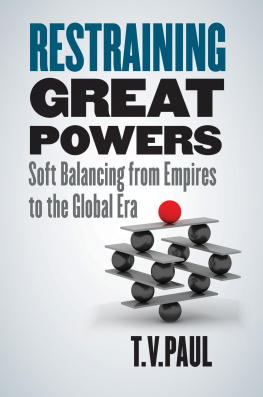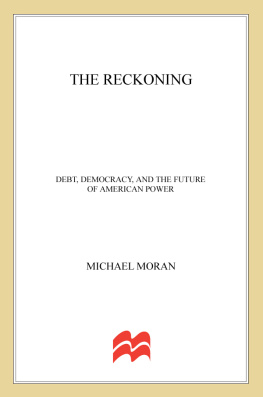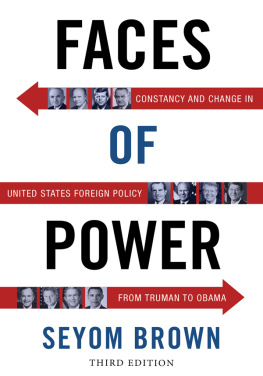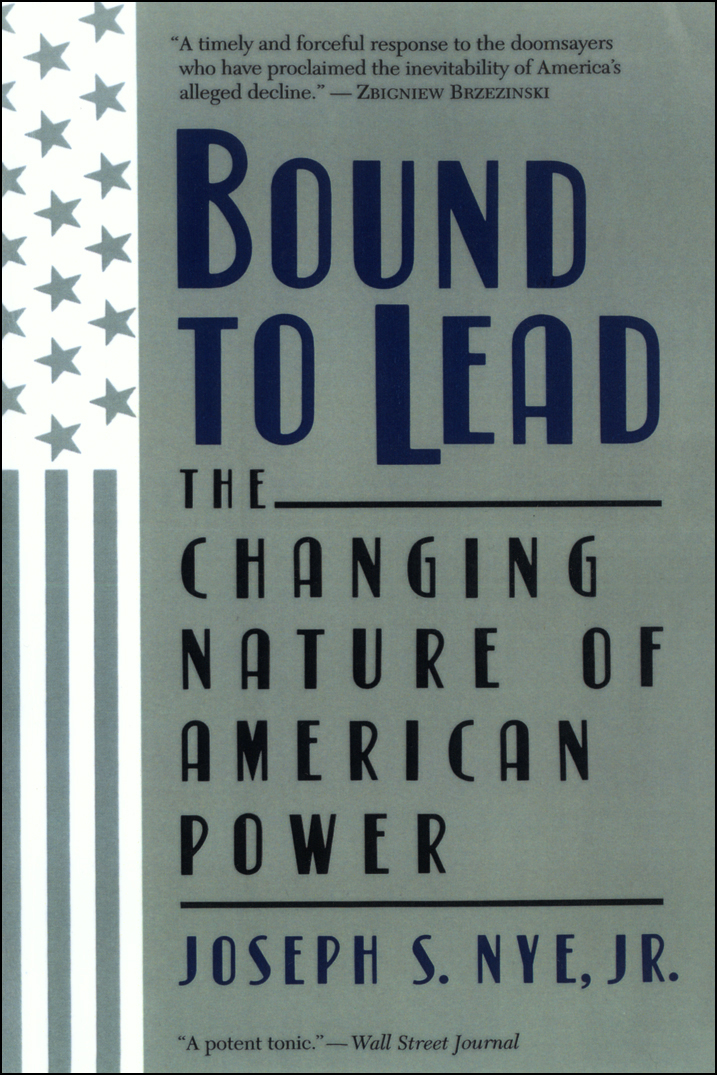BOUND TO LEAD


Library of Congress Cataloging-in-Publication Data
Nye, Joseph S.
Bound to lead: the changing nature of American power/Joseph S. Nye, Jr.
p. cm.
Includes bibliographical references.
ISBN 978-0-46509-416-5 (eBook)
1. United StatesForeign relations1945- 2. World politics1945-. 3. Power (Social sciences). 4. GeopoliticsUnited StatesHistory20th century. I. Title.
E840.N94 1990
973.92dc20 89-43099

Copyright 1990 by Basic Books, A Member of Perseus Books, L.L.C. Preface to the paperback edition copyright 1991 by Basic Books.
All rights reserved. Printed in the United States of America. No part of this book may be reproduced in any manner whatsoever without written permission except in the case of brief quotations embodied in critical articles and reviews. For information, address Basic Books, 10 East 53rd Street, New York, NY 10022-5299.
Designed by Vincent Torre
Printed in the United States of America
98 99 00 LP 10
To Bob Bowie, Stanley Hoffmann
and Bob Keohane
great teachers, critics, friends
Table of Contents
Guide
Contents
In our planets geology, the great tectonic plates shift slowly until a tension builds that we experience as an earthquake. World politics is sometimes similar. For the last forty years, world order rested on the seemingly stable bipolar structure of power that followed World War II. However, economic, social, and political strains were building beneath the surface. The first earthquakes were felt with the Eastern European revolutions of 1989. And it is unlikely that all the tremors are over. The second Russian Revolution is still in its early stages. Foretelling its shape a decade from now is as difficult as it would have been in 1789 to imagine the future of France.
Saddam Husseins invasion of Kuwait in August 1990 was another major tremor. Ironically, Saddam correctly appraised the waning power of his Soviet ally, and in a February 1990 speech in Amman, Jordan; he described the United States as the country that will maintain its superiority as a superpower without an equal to compete with it. Yet he drew the conclusion that he could safely attack Kuwait. Consistent with the diffusion of power described in chapter 6, the nature of the postCold War world order remains fluid and full of surprises.
A happier sense of surprise was conveyed by Czech President Vaclav Havel when he addressed the American Congress. Remarking on the rapid changes in the world, the former playwright said that four months out of prison and two months into his presidency, he observed that even playwrights, who have to cram a whole human life or an entire historical era into a two-hour play, could scarcely understand the contemporary rapidity of political change. And if it gives us trouble, Havel continued, think of the trouble it must give to political scientists who spend their whole lives studying the realm of the probable.
Several significant changes have occurred since this book was first published in April 1990, but fortunately they are consistent with its main thesis. Soviet power has declined and its empire collapsed more rapidly than expected, but that is an acceleration of the trend described in chapter 4. Germany has reunified much more rapidly than expected, but the key question, as explained in chapter 5, remains the pace of European integration. Alone, a unified Germany remains only one-quarter the size of the United States. The American economy slipped into a recession that will produce gloomy economic numbers for a time, but dips in the business cycle are to be expected. Recession is not a good indication of long-run trends unless it leads to prolonged depression.
The American response to the Persian Gulf crisis demonstrated, as this book argues, that the United States remains the only country with significant hard and soft power resources. But the long-term effects of the Gulf crisis depend less upon those American resources than upon the lessons that the American public draws from the experience. History suggests caution, for in the 1920s and the early 1970s, the American public chose not to make use of its formidable power resources for international leadership. Then as now, the key uncertainties about Americas future role in the world revolved around domestic politics.
In 1988, Paul Kennedys best-selling The Rise and Fall of the Great Powers captured a public mood of anxiety about American decline at the end of the Reagan era. Reviewing Bound to Lead in June 1990, Kennedy distinguished between two schools of thought about Americas future. Declinists, such as he, believe that Americas position relative to the rest of the world will continue to worsen. Revivalists (the label he assigns to me) are not purblind optimists, but they believe either that the talk of Americas decline has gone too far, or that, while things are indeed wrong, they can be corrected. That is a fair assessment of the thesis of this book.
Before the Gulf crisis, the belief in decline had already colored interpretations of current events. A striking case in point was Lignes dHorizon, a book published in 1990 in Paris, written by Jacques Attali, a key adviser to President Mitterrand and the director of the new multilateral bank for Eastern Europe, who argues that the American decline is so steep that the future will be dominated by a European bloc and a Japanese-led Pacific bloc. At a more mundane level, a front-page article in the New York Times claimed that President Bushs inability to dominate the 1990 Houston Summit of the advanced industrial nations was a sign of slipping American power. Such accounts show little sense of history for, as described in chapter 8, when economic summitry began in the mid-1970s, the United States was similarly unable to dominate. By exaggerating American dominance in the past, declinists and their followers in the press find it easy to diminish Americas present.
Similar problems plague declinist efforts to prove domestic social decay. Without question, some problems, such as drug abuse, violent crime, and the crisis in secondary education, are worse today than they were thirty years ago. But others, such as institutionalized racism or the position of women in society, are better. Still others are hard to evaluate.
The same can be said of the economic picture. Important industrial sectors such as consumer electronics and automobiles have slipped badly. The household savings rate dropped from 8 percent in the 1970s to 5 percent in the 1980s, and the government deficit subtracted another 3 percent. Since gross investment stayed roughly the same, the missing savings were made up by capital imports that transformed the United States into the worlds largest debtor in absolute terms.
The declinists stress this negative side of the ledger, but there is another side. During the 1980s, the American economy grew by 2.5 percent a year, above its historical average of 2 percent over the past century. Contrary to Attalis view of the United States as merely Japans granary, industry contributed the same one-fifth of the gross national product that it had in the 1970s. Productivity in manufacturing rose by 3.5 percent per year in the 1980s, and absolute productivity (product per worker) remained higher than in Japan or Germany. The United States remains in the forefront of such high-tech industries as aircraft, chemicals, biotechnology, software, and computers. Moreover, some economists believe that the slower 1 percent rate of growth of overall labor productivity (that is, in all sectors) is an underestimate that reflects the difficulty of measuring productivity increases in the service sector.








